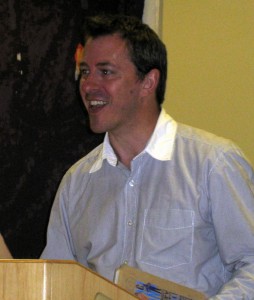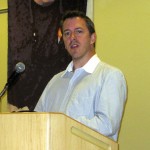No Impact Man follows up
A few days ago, Colin Beavan ("No Impact Man") came to St. Louis to discuss his book (at one of the branches of the St. Louis Public Library). I have previously posted on his fine book. I did so because I was impressed that Beavan was actually doing something to dramatically decrease his impact on the planet rather than simply talking about doing something.
Beavan offered much good advice at his recent talk. In his book, he offered lots of nuts and bolts about lessening one's impact on the planet. At last week's talk, he focused quite a bit on motivating us to change ourselves. Here are some of his points:
- "I'm the only person I can change."
- There are 14,000 dead lakes in the United States and Canada, lakes that used to have water.
- In the UK, the political parties strive to show who can do more to save the environment, which is dramatically different than it is in the United States.
- "Just look around this room . . . How cool are libraries! What a great model, sharing things--passing them from person to person."
-"What I did was always intended to have an element of stunt."
- The best thing about my year-long experiment was getting rid of television.
- The average American throws away 40 items of clothing per year.
- The hardest part about getting anything done to lessen the impact of people on our environment is "changing habits."
- Americans are overworked so much that they don't have the time to spend with their loved ones. "We are out of balance."
- "Where do I find the time to make bread?"
- Progress "might not mean more technology."
- The average American watches 4.5 hours of television per day.
- "We've got to stop thinking that environmentalism is about deprivation."
 - Car-based urban planning leads to obesity and loneliness.
- The interests of the people must be aligned with the interests of the planet. We need to make personal and business decisions that are in line with our values. When we do this, our institutions will become more functional.
- If someone who resists says that he is concerned about national security, ask him why he would want to rely upon unstable regimes for energy.
- The wastebasket was not invented until 1900.
- The problem about our environment is not about good and evil. It's about systems that are not working.
- We all have the capacity to do good. Use your talents to make a difference.
- when someone comes up to me and says "you should talk about X," I tell them "no, YOU should talk about X."
-To are the straws that broke the camel's back. Anyone can be a hero.
- We have a choice. You can be the victim of your culture or you can be the master of your culture.
- There is no profit in local farming. Please support them, and you'll be proud.
- "No-impact is not a religion."
- Beware of talk about carbon offsets. It doesn't undo the damage. I call it "carbon penitence." It's not a bad thing, but we should instead find renewable energy and invest in it.
- How can we change other people? "Listen and love instead of telling and anger."
- Car-based urban planning leads to obesity and loneliness.
- The interests of the people must be aligned with the interests of the planet. We need to make personal and business decisions that are in line with our values. When we do this, our institutions will become more functional.
- If someone who resists says that he is concerned about national security, ask him why he would want to rely upon unstable regimes for energy.
- The wastebasket was not invented until 1900.
- The problem about our environment is not about good and evil. It's about systems that are not working.
- We all have the capacity to do good. Use your talents to make a difference.
- when someone comes up to me and says "you should talk about X," I tell them "no, YOU should talk about X."
-To are the straws that broke the camel's back. Anyone can be a hero.
- We have a choice. You can be the victim of your culture or you can be the master of your culture.
- There is no profit in local farming. Please support them, and you'll be proud.
- "No-impact is not a religion."
- Beware of talk about carbon offsets. It doesn't undo the damage. I call it "carbon penitence." It's not a bad thing, but we should instead find renewable energy and invest in it.
- How can we change other people? "Listen and love instead of telling and anger."

